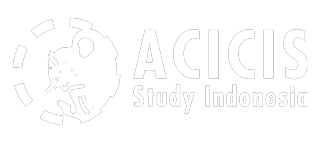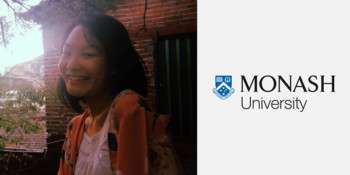Evangeline Yong was a participant in the 2021 Virtual Law Professional Practicum. Evangeline is studying a Bachelor of Laws at Monash University. Evangeline received a $3000 New Colombo Plan mobility grant to support her participation on this program.
Q: Why did you decide to undertake the ACICIS program?
I wanted practical legal experience in an Indonesian organisation and to strengthen my skills in cross-cultural communication and cross-jurisdictional practice.
Q: Did you receive a New Colombo Plan Mobility Grant? Do you think the NCP is an important initiative?
Yes, I received the NCP Grant, which enabled me to undertake this unit. I think it is an important initiative and opportunity that develops and enriches the cross-cultural knowledge and experiences of Australian undergraduates.
Q: How have you found the academic components of this virtual program – i.e. the language classes/seminars?
The highlight of the program for me was the language classes. I really enjoyed the collaborative learning style as we often worked in teams in breakout rooms to practice vocabulary. We were also regularly quizzed on our knowledge in a fun and engaging way – using flashcards and interviews with the teacher at the start of the class.
Q: What organisation are you interning with?
I interned with the Centre for Detention Studies. My role was predominantly assisting with research, with the final product being a literature review on the issue of drug use and trafficking in and out of prison institutions.
Q: How have you found the work culture (albeit online) of your host organisation? How is it different to work experience in Australia?
I found the work culture very different to Australian work experience. I had to take much more initiative to establish expectations and deadlines with my host organisation and the pace was significantly slower and more relaxed compared to what I was accustomed to. However, I enjoyed the flexibility of the working hours and the autonomy to shape and direct the tasks and research according to my strengths and interests. I also appreciated how patient and encouraging my mentors were in giving me feedback and reviewing my work, while simultaneously negotiating language barriers (as my Bahasa was limited to non-existent so we predominantly spoke in English).
Q: What are the main skills you have learnt during your virtual internship?
I developed crucial research and writing skills, as well as cross-cultural communication skills in a professional context.
Q: What did you find to be the most rewarding part of this virtual experience?
The most rewarding part was the language classes and the progress that I achieved in my language ability over the space of a few short weeks – it was definitely a testament to the outstanding language program and the wonderful teaching of Ibu Fitri, my language teacher! Terima kasih, Ibu Fitri!
Q: Were you able to learn about the Indonesian culture from this virtual program? If yes, how was this achieved?
Yes, I definitely learned about Indonesian culture through the seminars and my host organisation – conversations with my mentors and the seminar discussions gave me insights into workplace culture and politeness conventions which I otherwise would not have known about.
Q: How will the virtual internship benefit or influence your future career?
It will give me important networks and experiences in a cross-cultural professional setting, which will benefit my future career as I hope to work in international human rights law and collaborate with human rights organisations.
Q: Favourite Indonesian word/phrase:
Makasih banyak!
Q: Describe your experience of the virtual internship program in three words:
Challenging, eye-opening, unique


